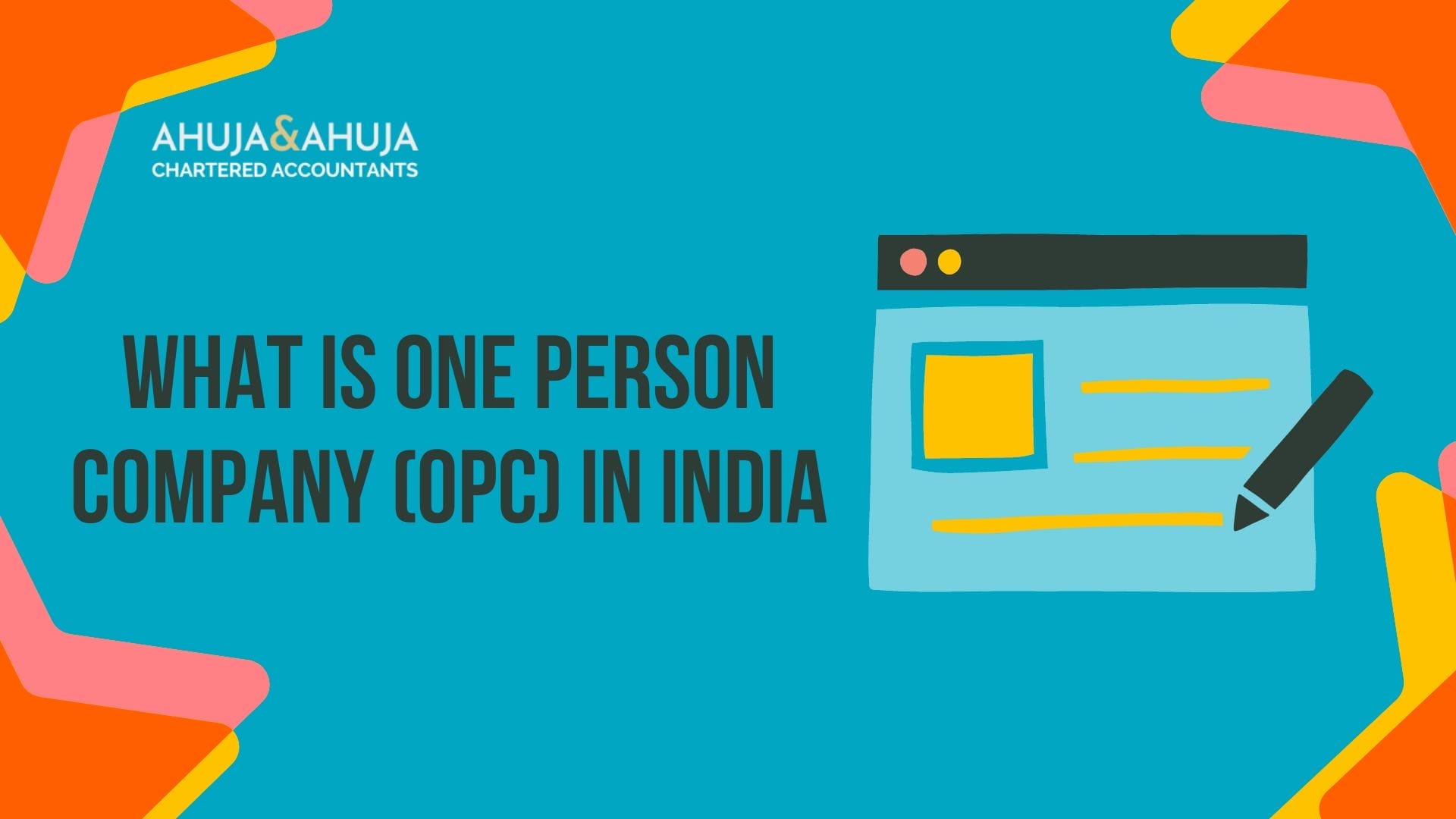What is One Person Company (OPC) in India: A Comprehensive Guide
In the world of startups and entrepreneurship, the business landscape is constantly evolving. The Companies Act, 2013 enabled the formation of a completely new genre of companies in India, known as One Person Company (OPC). As the name suggests, an OPC can be formed with just a single member, gracing it with a unique combination of company structure and proprietary management. The primary intention of introducing OPC in India was to support entrepreneurs who are capable of starting a venture single-handedly by allowing them to create a separate legal entity.
The key advantage of forming an OPC is the limited liability conferred upon the company’s director. This means that any debt or liability incurred by the OPC cannot be attributed to the director. This concept of limited liability creates a distinction between the company and its directors. Detailed information about the intricacies of company registration can be found here.
Incorporation of OPC
The incorporation of an OPC involves two methods, as mentioned below:
1. Incorporation through SPICe (Without filling RUN)
Stakeholders can avail of five different services in a single form by applying for the incorporation of a new company through SPICe form (INC-32). The services include Name Reservation, Allotment of Director Identification Number (DIN), Incorporation of New Company, Allotment of PAN, and Allotment of TAN.
The eMoA (INC-33), eAOA (INC-34) can be used to apply, but if these forms are not applicable, users are required to attach the PDF attachments of MoA and AoA. The Simplified Proforma for Incorporating Company electronically (SPICe), along with the requisite forms, can also serve for obtaining a digital signature, which is explained in detail here.
2. Incorporation through SPICe (With RUN)
The Reserve Unique Name (RUN) service is used for name availability. Once the name has been approved, form SPICe should be filed for the incorporation of the OPC within 20 days from the data of approval of RUN.
Also, it’s important to remember that the OPC must file form INC-22 within 30 days once form SPICe is registered, in case the address of correspondence and registered office address are not the same.
In addition to the incorporation process, another significant aspect of managing an OPC is ensuring compliance. There is a specific list of compliances that companies are obligated to adhere to annually, thus contributing to maintaining the legal sanctity and operational transparency of the organization.
Membership Changes in OPC and Mandatory Communications
One of the significant aspects of managing an OPC lies in how it handles changes in its membership and communicates mandatory information to the Registrar of Companies (RoC).
1. Change in Membership
In the life cycle of an OPC, a scenario might arise necessitating a change in membership, such as cessation due to the member’s death, incapacity to contract, or a willing change in ownership. To formally recognize this change, the OPC is required to file Form INC-4. This document not only covers the cessation details but also requires the identification of the new member assuming the role.
2. Mandatory Conversion into Private or Public Company
An OPC enjoys certain privileges and flexibilities, yet it is governed by regulations that necessitate its conversion into a private or public company beyond certain thresholds. Specifically, if an OPC’s paid-up share capital exceeds fifty lakh rupees or its average annual turnover in the immediate preceding three financial years surpasses two crore rupees, it must convert into either a private or a public company.
To initiate this conversion, the OPC must inform the RoC by filing Form INC-5. This filing should occur within sixty days of exceeding the prescribed thresholds, marking a pivotal transition in the company’s lifecycle and operational scope. Further, the conversion process entails the filing of Form INC-6, which details the requisite for conversion, ensuring legal compliance and officially marking the transformation of the business entity here.
OPC – A Vital Component of Corporate India
An OPC stands out as a business structure that offers a blend of efficiency, simplicity, and legal safeguarding for entrepreneurs. It empowers individuals to launch and manage their ventures, enjoying the benefits of an incorporated entity. Notably, an OPC’s transition into a corporate entity like a private or public company marks a significant milestone, reflecting its growth and the augmented responsibilities that come with scaling operations.
For individuals aiming to navigate the financial complexities with ease, professional guidance can be sought here, ensuring that the financial health and regulatory adherence of the OPC are meticulously managed.
Eligibility and Regulatory Framework of OPC
Navigating through the foundational aspects of a One Person Company (OPC) unveils the importance of understanding its eligibility criteria, regulatory framework, and strategic operational advantages. This segment provides insights into who can start an OPC, the legal and regulatory outlines defining its operations, and how it stands within the ambit of corporate governance in India.
Eligibility to Act as a Member of an OPC
A pivotal rule in the OPC framework is regarding eligibility:
- Eligibility Criteria: Only a natural person who is an Indian citizen and resident in India is eligible to incorporate and operate as an OPC. For clarity, the term “resident in India” refers to a person who has stayed in India for a period of not less than 182 days during the immediately preceding financial year.
- Restrictions: A significant restriction is that a person can be a member of only one OPC at a time. This rule is in place to prevent any individual from forming multiple OPCs, ensuring a fair and distributed approach to leveraging this business structure.
- Nominee Involvement: In circumstances where a member of an OPC becomes a member of another OPC by virtue of being a nominee, regulations necessitate withdrawing membership from either of the OPCs within 180 days. This constraint underscores the commitment towards maintaining the one-person-one-company ethos.
Legal and Operational Framework
- Characteristics of OPC: Distinguishing features like immunity from non-banking financial investments, limitations against converting into a Section 8 company, and prohibition from executing certain types of business ventures set the ground rules for OPC operations. Further, the stipulation that an OPC cannot involuntarily alter its corporate structure until two years post-incorporation, unless specific financial thresholds are reached, adds another layer of regulatory adherence.
- Compliance and Conversion: Adhering to compliance requirements is pivotal for OPCs. This includes annual filings, audit requisites similar to private limited companies, and mandatory conversions into private or public companies upon crossing certain financial benchmarks. The regulatory landscape mandates a keen understanding of these requirements to ensure seamless operations. For specific nuances on compliance, one can refer to the details here.
The Distinct Space of OPC in the Corporate Ecosystem
OPCs carve a unique niche within the Indian corporate ecosystem, offering individuals the dual advantage of singular ownership while enjoying the benefits of limited liability and corporate stature. This business model is particularly appealing to solo entrepreneurs, consultants, and freelancers who aspire to establish their brand identity in the market without the complexities of having multiple stakeholders.
As OPCs continue to gain traction, understanding the nuances of their formation, operation, and transition becomes essential. The strategic consideration of becoming an OPC involves evaluating the long-term business vision, compliance adherence, potential for growth, and eventual transition into a broader corporate entity as the business scales.
Final Word: OPC in India
The introduction of the One Person Company (OPC) structure under the Companies Act, 2013, has been a transformative move for the Indian business landscape. It has opened new avenues for entrepreneurs to venture into the corporate world with ease and flexibility. By adhering to the laid out regulatory framework and leveraging the benefits it offers, OPCs stand as a testament to the evolving entrepreneurial spirit.
As we continue to explore different facets of corporate operations, the significance of informed decision-making, strategic planning, and compliance adherence can never be overstated. For aspiring business owners, understanding the comprehensive dynamics of OPCs can pave the way for informed and successful business ventures.
Disclaimer
The materials provided herein are solely for educational and informational purposes. No attorney/professional-client relationship is created when you access or use the site or the materials. The information presented on this site does not constitute legal or professional advice and should not be relied upon for such purposes or used as a substitute for professional or legal advice.







